The Economic Survey of 2019-20 dedicated a chapter to Ease of Doing Business in India. How has India improved on the doing business rankings of the World Bank? What does the Economic Survey say about the issues in the country?
In the past few years, India made substantial progress in the World Bank’s annual Doing Business rankings. The Doing Business Rankings (DBR) rate countries on the basis of ease of doing business. It takes into consideration the business environment and regulations, and policies that shape it in the country. As per DBR 2020, India has improved its ranking by 14 places to be ranked 63 out of 190 countries. However, detailed analysis of India’s performance in each of the parameters studied reveals that India still has a long way to go to do away with red-tapism.
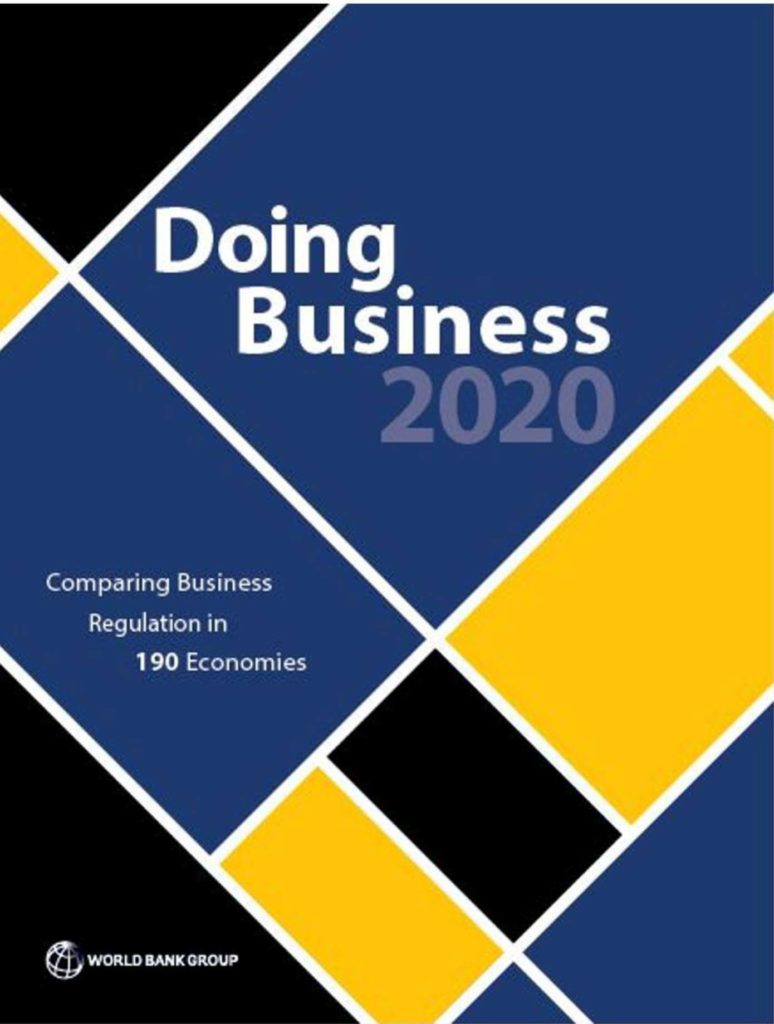
This year’s Economic Survey has a separate chapter dedicated to the analysis of parameters which India needs to improve on. The analysis made an attempt to identify the bottlenecks in India’s business environment.
What is the Doing Business Report?
Doing Business report is an annual flagship publication of the World Bank Group which studies the regulations on business activities by presenting quantitative measures of regulation and protection of property rights across countries. In simpler terms, the study compares different economies on the basis of how simple it is to operate a private business in the country.
For this, the report captures 12 areas of business regulation of which 10 areas are taken into consideration for scoring and ranking the countries. These 10 areas include starting a business, dealing with construction permits, getting electricity, registering property, getting credit, protecting minority investors, paying taxes, trading across borders, enforcing contracts, and resolving insolvency. The remaining two areas which are not used for ranking are regulation on employing workers and contracting with the government.

How is DBR calculated?
Questionnaires designed to make them comparable across different economies and periods of time are administered to more than 15,000 local experts across the world such as lawyers, accountants, business consultants and many others who deal with these regulations in their work. The data thus collected is subject to scrutiny and verification multiple times.
The data collected for 41 indicators (e.g. number of procedures, time taken, and cost) under the 10 areas covered for scoring and ranking are normalised and rescaled for comparison. Based on the best and worst performing economies for each indicator, scores are calculated for each indicator for each economy. The scores obtained are given equal weightage and the simple average is taken for each topic. Average across the ten topics gives the economy’s Doing Business Score on a scale of 1 – 100 where 0 is for the worst regulatory performance and 100 for the best.
The score indicates how far the economy is from the best performance and difference in score shows the extent of change in the business environment in the country. DBR is obtained by sorting the score and indicates the country’s performance relative to other countries. The Economic Survey has stressed on DBR.
What is India’s current position?
India has been ranked 63 out of 190 countries in terms of ease in doing business. India is one among the top ten countries that have shown most notable improvement in 2019 according to the report. Moreover, India has also been recognised as one among top ten countries that has taken maximum reforms in the last three years. Since 2011, India’s improvement in ranking is the highest by any large country.
In the South Asian region comprising of eight countries- Bhutan, Nepal, Maldives, Afghanistan, Bangladesh, Pakistan and Sri Lanka- India has been ranked first. New Zealand retained its first position in the world for ease of doing business.
India’s overall position stood at 133 (out of 183 countries) in 2009 and had further declined to 142 (out of 189 countries) in 2014. Since then, India has improved over 78 positions to secure 63rd rank (out of 190 countries).
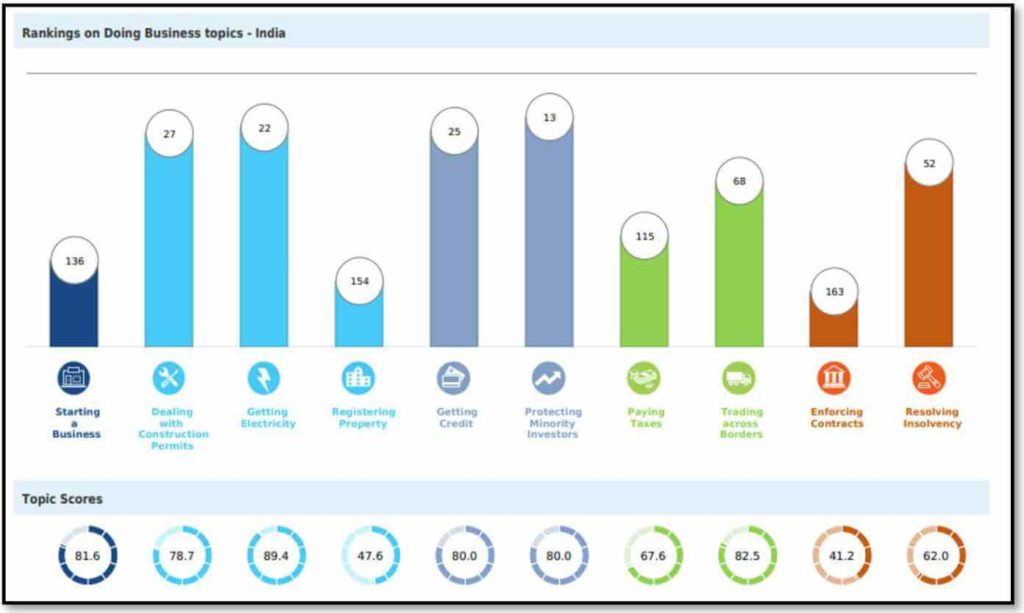
What are the areas in which India has improved?
India’s ranking in six areas- dealing with construction permits, getting electricity, getting credit, protecting minority investors, trading across borders, and resolving insolvency- are ranked below 70. However, in terms of ease of starting business, property registration, paying tax and enforcing contracts, India’s performance is still lagging and needs attention. The Economic Survey has acknowledged this.
India’s ranking with respect to registering property has been declining over the years. However, with respect to the remaining nine parameters, India’s performance has improved in the past decade. The following five parameters have shown a marked improvement in their rankings in just two years.
- Dealing with construction permits- India was ranked 181 in 2017 and 52 in 2018.
- Getting electricity- India’s rank was 137 in 2014 and 70 in 2015.
- Paying taxes- From 172 in 2016, India’s position rose to 119 in 2017.
- Trading across borders- India’s rank was 146 in 2017 and 80 in 2018.
- Resolving Insolvency- In 2019, India’s rank improved to 52 from 108 in 2018.
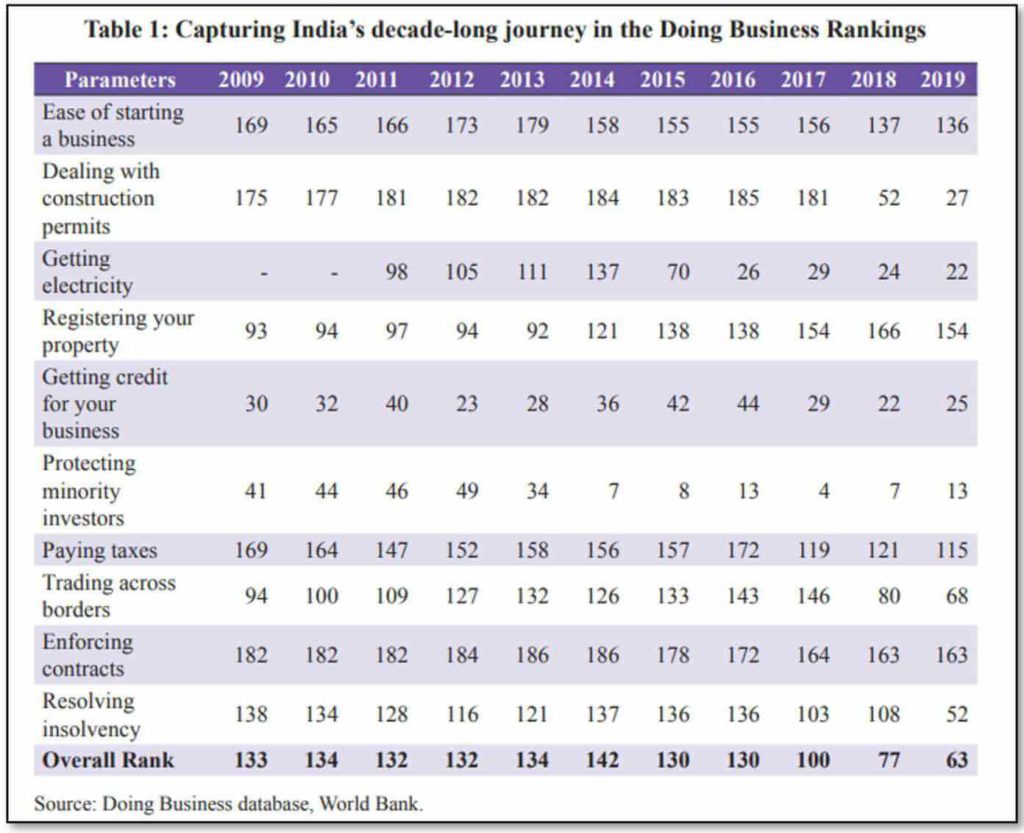
What caused this sudden change?
According to the response by the Ministry of Commerce and Industry in the Lok Sabha, the following were mentioned as reasons for the improvement.
An online single window system was introduced in Delhi and Mumbai (by Municipal Corporations), which has helped in saving time considerably for getting construction permits. Furthermore, approval and inspection have also been made faster in Delhi. Also, in Delhi, service line charges were capped to Rs. 25,000 in electrified areas for low tensions up to 150 KW in addition to making the work faster.
Similarly, in the case of cross-border trade, the government has introduced online initiatives which allow online submission of documents. Other initiatives to save time and cost in this area include electronic sealing of containers, 24/7 clearance and improved port infrastructure. Only 5% of the goods will be inspected.
Paying tax has been simplified with GST for the entire country. Slashing corporate income tax rate for companies with a turnover more than Rs. 250 crores and reduction in administrative charges of EPFS are other reasons cited.
India’s performance in resolving insolvency has been attributed to the Insolvency and Bankruptcy Code (IBC) which promoted reorganization proceedings in practice. The Lok Sabha answer further adds that time taken to resolve insolvency in India is now comparable to OECD countries.
What is the difference between India and New Zealand, which is ranked ONE ?
The table below compares India and New Zealand on the four parameters in which India lags, as per Economic Survey.
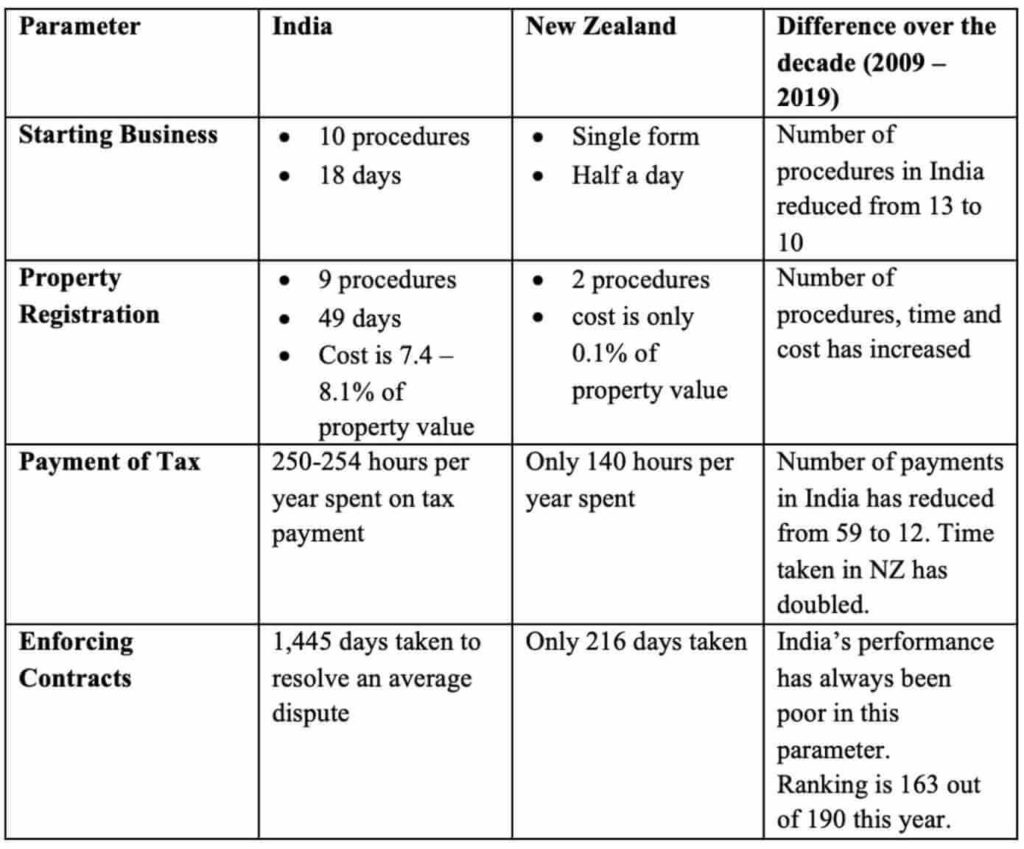
What are the problems in India?
The main problems in India have been explained in the Economic Survey with useful case studies.
For instance, despite bars and restaurants being crucial sources of employment, to open a restaurant, according to the National Restaurants Association of India, a total of 36 approvals are required in Bengaluru, 26 in Delhi and 22 in Mumbai. In Delhi and Kolkata, a ‘Police Eating House License’ is also required for which around 45 documents need to be furnished. This is in contrast to the number of documents required for procuring arms and fireworks which require only 19 and 12 documents respectively.
Similarly, it can also be seen that it takes only over two months to obtain a construction permit in Hong Kong whereas in Delhi it takes about four months. It takes 35 days to get water and sewage connection in Delhi.
On an average, India takes around 64 hours on the border for documentary compliance for exports with a cost of $270. In the case of imports, the time taken for the same is 86 hours and the cost is around $366. This is in contrast to Italy where the time taken is only one hour for each. A lot of time is wasted in India for border handling processes.
For the manufacturing industry, there are 6,796 compliance requirements that need to be complied with, based on the manufacturer. This has been highlighted in the survey to show the complexity and range of rules in the sector.
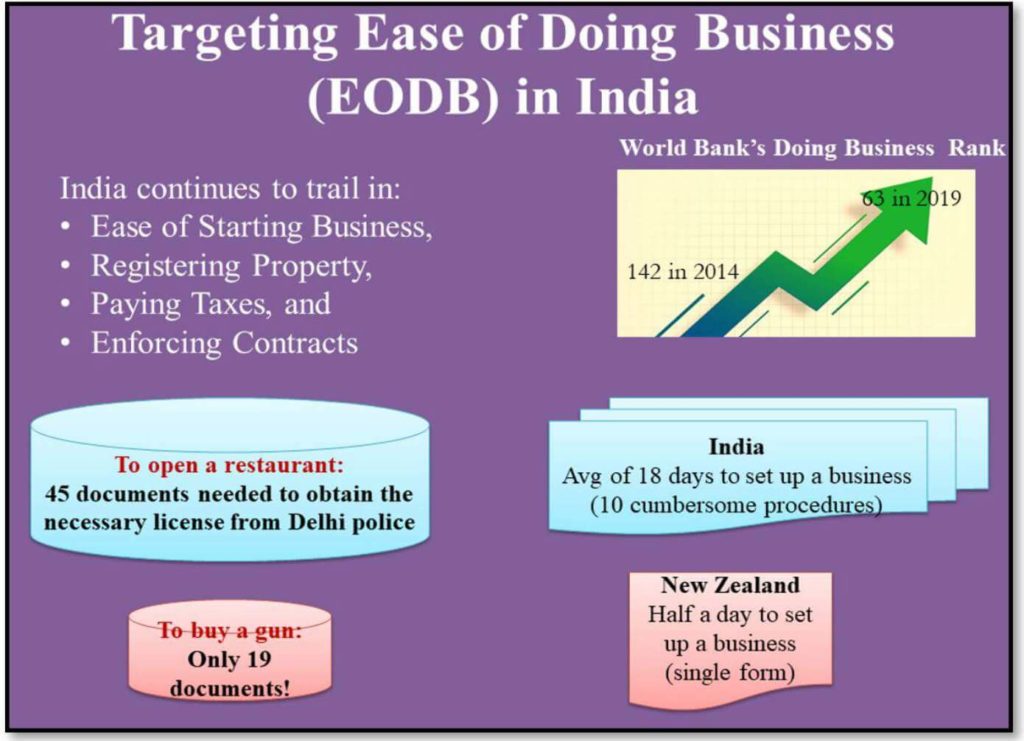
What needs to improve?
India has to mainly focus on improving the four parameters- Starting Business, Registering Property, Paying Taxes, and Enforcing Contracts. There are many complex rules and laws that have to be complied with in these areas. There are many regulatory hurdles and cumbersome procedures that need to be simplified in order to encourage more people to start a business here.
How reliable is DBR?
While the government has highlighted India’s improvement in the ranking, the reliability of the data needs to be discussed. The DBR mentions five broad limitations as described below.
- The data collected is about businesses in the largest business city and this may not be representative of regulation in other parts of the country. In India’s case, the data is collected from both Mumbai & Delhi with more weightage given to Delhi, being the capital.
- The data often focus on a specific business form (a limited liability company) of a may not be representative of the regulation on other businesses.
- Transactions described in a standardized case scenario refer to a specific set of issues and may not represent the full set of issues that a business encounters.
- The measures of time involve an element of judgment by the expert respondents.
- The methodology assumes that a business has full information on what is required and does not waste time when completing procedures. In practice, completing a procedure may take longer since the businesses lack information on the procedures.
Any reading of the DBR rankings & related analysis is to be done with the above limitations in mind.
Featured Image: Ease of Doing Business in India


